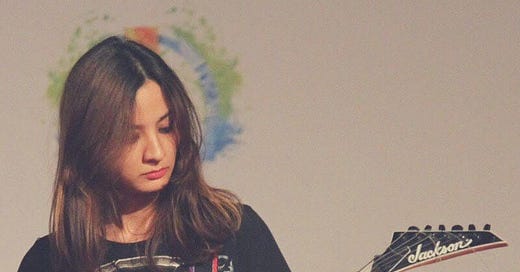Harmony Amidst Chaos: an Oasis for Iraqi Artists
Guitarist Sally Mohammed believes art is a necessary part of people’s lives and wants to carve out space for creative expression in Iraq.
It’s moving day for arts organization Fann Khana and Iraqi guitarist Sally Mohammed, also known as Sally Mars, who recently set up a new music studio in Bagdhad. People are milling about, making tea in the kitchen, and discussing plans for the new space, which welcomes artists of all kinds to learn, create, and collaborate in a safe setting free from the city's disapproving gaze.
Baghdad is not an easy environment for artists. There are few opportunities to turn artistic talent into a career, and most families discourage their children from considering it. “Artists don’t express themselves in Iraq because it’s like a prison for them. Society doesn’t appreciate the skills they have or the work they do,” says Mars, who set up Fann Khana a year ago so artists had somewhere to feel at home.
The idea proved popular, and last year she secured an Innovation Hub grant from Ideas Beyond Borders to expand Fann Khana and hire a larger space. Her hope is that more people will come and bring friends, inspiring others to discover and pursue creative talents and igniting an interest in art that will grow and spread.
“Iraqi society has a long history of war and corruption, so there are a lot of stories,” Mars says. “Often people can’t speak of these experiences due to fear or pain, but in novels, paintings, plays, music, we can find a way to express ourselves.”
For Mars, music is the only authentic way to do this. As a teenager, her family discouraged her from playing, so she practiced in secret, slipping out for band rehearsals and watching her favorite metal and rock artists on YouTube. At school, other students bullied her for being a female guitar player. “When somebody does something out of the ordinary in Iraq, society turns on them for being different,” Mars says.
Being a female guitarist, particularly one who plays heavy metal and rock music, carries risks in Iraq. The scene is small, with just a handful of bands performing underground, quietly distributing invitations among friends to avoid notice. “It is very dangerous for a female person to play these genres in Iraq; people see it as revolutionary—they say that person abandoned their religion and society,” says writer Ahmad Fawzy, a regular at Fann Khana.
Metal music has always been taboo in Iraq. Growing up under the Baathist regime, this was part of its appeal, says Ideas Beyond Borders founder Faisal Al Mutar, who recalls the potent allure of metal music counterculture as a teenager navigating the strains of life in Iraq.
“It offered a much-needed distraction from the day-to-day suffering we were all privy to: witnessing dead bodies being thrown in the streets not far from my high school, baking in the extreme heat during the summers with little to no reliable electricity, and living in a failed state,” he says. “The teenagers who grew up in Baghdad during this time came away with deep scars, both physical and mental. I think many of us felt a kinship with the anger and veracity that metal music embodies.”
Fifteen years later, some things have changed. Society may still be hostile to female guitarists, and Iraqi parents still steer their children away from the arts, but younger generations connected by social media to the outside world, have new channels and modes of expression. “Art has always been a vehicle for truth, and there have always been those who seek to erase it,” says Al Mutar. “Organizations like Fann Khana are an act of defiance – against attempts to stifle creativity and shut out artistic expression.”
For Mars, the guitar has never felt like a choice, and her family has begun to accept it. Playing metal music is the only time she feels truly herself, and she wants others to experience the same, whether through painting, writing, making films, taking photographs, or any other creative medium. “People should have art in their lives. Iraqi society puts walls around your soul. Art is a way to break them down and find peace.”
This article was written by Olivia Cuthbert.





